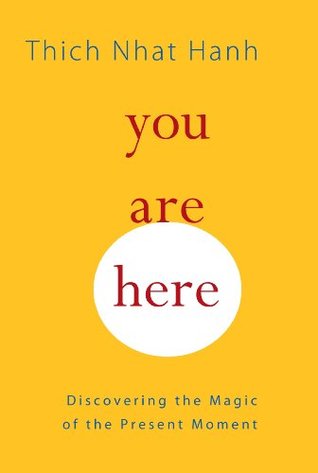More on this book
Community
Kindle Notes & Highlights
Breathe in and tell yourself that a new day has been offered to you, and you have to be here to live it.
“Breathing in, I know that I am breathing in.” When
You should talk to your depression or your anger just as you would to a child.
Struggle is useless. Stop struggling.
Peace is contagious. Happiness is also contagious, because in the practice of meditation, the three elements of body, mind, and breath become one.
The miracle of mindfulness is, first of all, that you are here.
How can you love if you are not here? A fundamental condition for love is your own presence.
In order to love, you mus...
This highlight has been truncated due to consecutive passage length restrictions.
You are here, body and mind together. You are here, alive, completely alive. That is a miracle.
life is accessible only in the here and now.
practice resurrection,
compassion is not possible without pain and suffering.
Without suffering, we do not have the opportunity to cultivate compassion and understanding; and without understanding, there can be no true love.
Happiness is a function of compassion. If you do not have compassion in your heart, you do not have any happiness.
The First Noble Truth of Buddhism is about recognizing the existence of suffering.
through touching suffering that we discover the Fourth Noble Truth, the path to healing.
The First Noble Truth is dukkha, suffering.
The Fourth Noble Truth is magga, the path that transforms suffer...
This highlight has been truncated due to consecutive passage length restrictions.
We should not try to escape from our pain. We should look at it directly. Looking at suffering deeply, we will have deep insight into its nature, and the path of transformation and healing will present itself to us.
practice this technique of total relaxation every day,
“I am here for my breathing; I am here for my body; I am here for my troubles, for my depression, and for my suffering.”
What is loving? It is recognizing the presence of the other with your love.
You open your mouth and you utter the magic words of the mantra: “Dear one, I am really here for you.”
To be loved is to be recognized as existing.
embrace them with the energy of mindfulness, with your true presence, this energy is completely nourishing.
The third miracle of mindfulness involves maintaining your own presence and your mindfulness of the other.
The message of our Buddhist practice is simple and clear: “I am here for you.
Buddha taught that “I” is a combination of the following five elements: 1. our form (physical body) 2. our feelings 3. our perceptions 4. our mental formations 5. our consciousness
the five elements, or aggregates (skandhas in Sanskrit, literally “heaps”
Perceptions can be either accurate or inaccurate, and every time we have a false perception, suffering occurs.
“Is my perception accurate?” Just
Look at your perceptions and smile to them. Breathe, look deeply into their nature, and you will see that there are many errors in them.
If you are the victim of your false perceptions, you will suffer a lot.
When conditions are sufficient, something manifests. That is what we call a formation.
Your anger and your hope are mental formations. In my tradition of Buddhism, we speak in terms of fifty-one mental formations.
Consciousness is like the soil in which the seeds of the mental formations are preserved.
Each of the fifty-one mental formations lies buried in the soil of consciousness in the form of a seed (bija in Sanskrit).
Descartes said, “I think, therefore I am.” In light of the Buddha’s teaching, you might say, “I think, therefore I am . . . not here.
When you walk, you should be here. When you walk, it is not for the future; it is not in order to get somewhere. With each step you take, you arrive in the here and now.
the words of the Buddha, “The past no longer exists, and the future is not here yet.
get deeply in touch with the food, which is a gift from the earth and sky. I use gathas, practice poems, during meals. When I chew, I say, “I have arrived, I am home”
I have arrived, I am home, In the here and in the now. I am solid, I am free, In the ultimate I dwell.
Stopping is an essential aspect of Buddhist meditation.
Buddhist meditation, you will find that it has two aspects: first, stopping, and then, deep looking.
Stopping (shamatha in Sanskrit) and deep looking (vipasyana) are the elements of Buddhist meditation.
nirvana, or “suchness.” Nirvana is the extinction of all concepts, such as existence, nonexistence, death, and birth.
touch your nature deeply, you will see that it is the nature of no-birth and no-death.
The energy of mindfulness is the energy of the Buddha,
Freedom is the basis of all happiness. Without freedom, there is no happiness. This means freedom from despair, freedom from resentment, freedom from jealousy and fear.
at the present moment, we see the past and the future in it.


